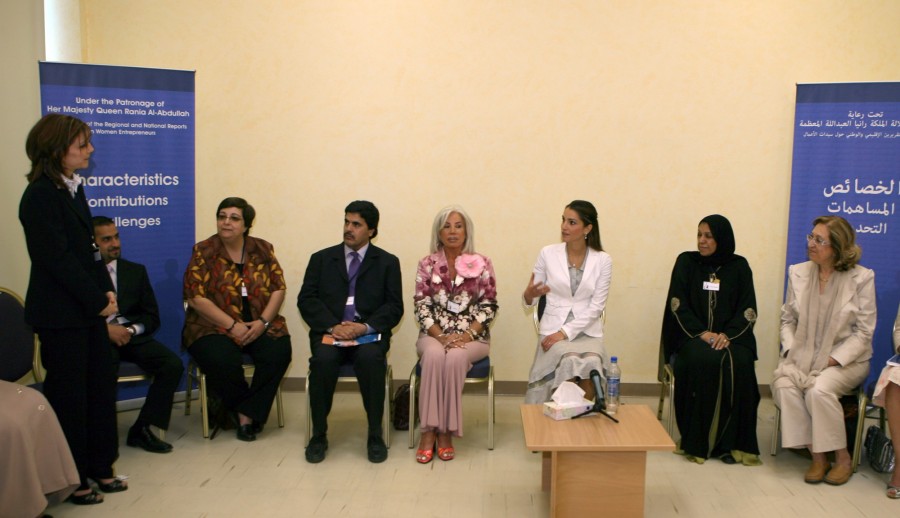Queen Rania Attends Launch of National and Regional Reports Entitled: “Women Entrepreneurs: Characteristics, Contributions and Challenges"

(Jordan Times, Khalid Neimat - Amman) Reducing the time it takes to register a business and increasing access to capital topped list of major challenges facing women entrepreneurs in Jordan, according to two reports released today.
The national and regional reports, entitled: “Women Entrepreneurs: Characteristics, Contributions and Challenges,” outline main successes and challenges facing businesswomen in the Middle East and North Africa (MENA).
The reports are part of a cooperative effort between the World Bank Group and International Finance Corporation and the Tunisian-based Centre of Arab Women for Training and Research.
During the launch ceremony, Her Majesty Queen Rania described the Arab women surveyed in the reports as the future of the Arab world.
“The reports draw attention to the future steps needed to support and strengthen women’s role in business, through improving the economic atmosphere in the Middle East and North Africa,” she said.
The reports study the progress of businesswomen in Bahrain, Jordan, Lebanon, Tunisia and the UAE.
Among their recommendations are promoting business ownership and loans and guarantees for small- and medium-sized business and introducing flexible labour laws to meet minimum requirements of Arab women businesses owners.
“MENA women entrepreneurs are most likely to own firms in the service sector, in retail trade, or in nondurable manufacturing. The majority are well-educated, married and have children,” the regional report says.
The report also states that women business owners in the MENA are well ahead of their counterparts in Western Europe and North America with respect to the size of their firms and their revenues.
“In Bahrain, 10 per cent of firms surveyed generate more than $100,000 per annum, as do 6 per cent in Jordan, 18 per cent in Tunisia and 33 per cent in UAE,” says the report.
“Between 61 per cent and 88 per cent of survey participants expressed optimism regarding their own enterprises, while 47 per cent to 87 per cent expressed optimism about their national economic prospects,” both reports note.
The regional report indicates that between one-quarter and one-half of Arab businesswomen are trading internationally and utilise information and communications technology well above the per capita average worldwide.
Among the top challenges facing women are: learning financial management skills, finding and keeping good employees, access to capital and the high cost of public services.
“Most women business owners are interested in receiving external training and support services,” the reports say.
“With limited access to formal finance, women are financing their businesses mostly through personal sources including savings, friends and family and by reinvesting business earnings.”
Featured
Queen Rania's official website
This website does not support old browsers. To view this website, Please upgrade your browser to IE 9 or greater
Your browser is out of date. It has known security flaws and may not display all features of this and other websites. Learn how to update your browser



